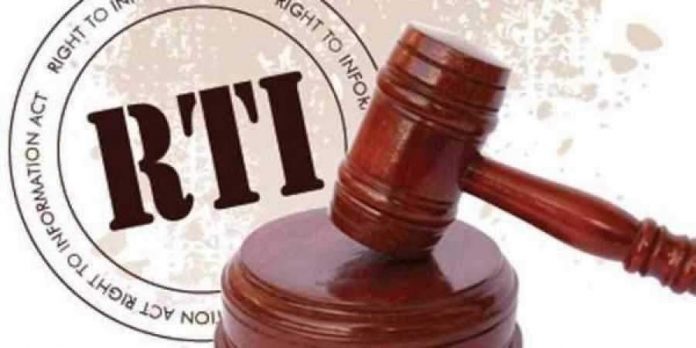This article is written by Gitika Jain pursuing BBA.LLB(Hons) from Amity University, Kolkata. This article deals exhaustively with the exemptions under the RTI Act.
Table of Contents
Introduction
The most integral part of the right to freedom of speech is the right to information. But it has certain restrictions also that are imposed under Article 19(2). The importance of information in everyday life can have a conflict with other public interests, for example, optimum use of limited physical resources, efficient operations of the Government and preservation of sensitive information in order to maintain confidentiality. It is therefore important to bring in harmony these conflicting interests and preserve the democratic ideal. In order to achieve this, Section 8 of RTI has been enacted to exempt certain things from the disclosure of information. In the case of Rakesh Sanghi v. International Advanced Centre for Powder Metallurgy and New Materials, Hyderabad it was held by the Central Information Commission (CIC) that the right of the citizens to ask for information is not absolute and it is subject to certain conditions by the government.
The government as and when it deems fit, may impose certain exemptions from disclosure of information. CIC at that time was of the opinion that no benefit whether tangible or intangible can be expected by disclosing any information of the research and technological institutions to the public at large. In the People’s Union for Civil Liberties v, UOI, it was considered by the apex court the extent of the right of information that is a fundamental right under Article 19(1)(a) of the Constitution and also import certain no restrictions under Article 19(2) to balance such disclosure of information. The Right To Information (RTI) is an important part of the freedom of speech and expression under Article 19(1)(a) of the Constitution of India. Therefore it can be considered as a fundamental right and the courts have also observed from time to time that every legal right is considered as an obligation on the part of the people and are subject to certain exemptions.
Matters on which exemption of right to information is applied
- International relations.
- National security including defence and public safety.
- Investigation detection and prevention of crime.
- Information received in confidence from the source outside the government.
- Internal deliberations of the government.
- The information which if disclosed would violate the privacy of the individual.
- Information of an economic nature which is disclosed would confirm and unfair advantage on some person.
- The information which is subject to a claim of legal professional privilege example communication between a legal advisor and the client or between a physician and the patient.
- Information about scientific discoveries.
The right to receive information on the right to be informed are implicit under Article 19(1)(a) of the constitution subject to only reasonable restrictions by Article 19(2) in order to maintain sovereignty and integrity of India or maintain friendly relations with the foreign States, public order, decency, morality, the security of the state, defamation or incitement to an offence. No right can be absolute, similarly, the right to information is also not absolute and has certain limitations. Right to privacy and right to information both fall under Article 21 and 19(1)(a) of the constitution respectively and are restricted and regulated for the interest of the public at large. In the modern state like this, no rights can exist uncontrolled or absolute. The right to receive information has been recognised by the Right to Information Act but at the same time limitations are also been provided in the Act and in the preamble itself.
Limitations of RTI
- The first limitation of RTI is the word limit of 250 words that have been put under Rule 4 of RTI Act, 2005 since the number of words are the main reason for rejection of application most of the time.
- Another rule that is Rule 5 of RTI Act, 2005 has stated a limitation where a person can only ask for the amount spent by them on machinery and not exceeding that. Rule 5(h) requires the authority to collect poster charge by an amount greater than rupees 10. This rule was passed in order to save the harassment of applicants for paying an unjustly high amount of the cost of application.
- Rule 16 of RTI Act 2005 provides that the proceedings which are pending before CIC will abate on the death of application. This limitation was passed in order to hide the corruption and decrease the misuse by corrupt people.
Information on record can only be accessed under RTI Act
The term public authority has been defined under Section 2(h) which includes the scope, ambit and limitations of it. The information which is not accessible by the public authority will not be under the control of the public authority. The right to access information is only available in cases where the information is in existence and available in records of public authorities. The non-available information cannot be furnished without an application from an applicant. In the case of the Central Board of Secondary Education and Another v. Aditya Bandopadhyay and Others, it was observed by the supreme court that the information which is not under the control of any public authority and cannot be accessed by any public authority does not fall within the scope of RTI act. The same view was shared by Patna High Court in Shekhar Chandra v. State Information Commissioner, Bihar, where it was observed that RTI includes only those information which is available and in records of the public authority. The information which is non-available and is not in the records of public authority is required to be collected and then made available to the applicant on application from them.
Section 8 exemption from disclosure of information
As we have already discussed, no rights provided in the constitution of India are absolute. So is the case with the right to information where certain restrictions are put and certain exceptions have been provided from the disclosure of information under Section 8 of the act states that it is not mandatory for the public authority to furnish any information that it has been asked by the citizen if it is contrary to Section 8 of the act.
The objective behind the RTI was to ensure that transparency in the governance and citizen is maintained and the citizens will have the right to know what they should know unless and until there is something which has been exempted from disclosing its information under Section 8 or Section 9 of RTI The term public interest can be used to define the general interest of the community at large that signifies interest of every particular individual. The term protected interest in this act means the interest of people who are protected under the Official Secrets Act, 1923. In Union of India v. Rahul Rasgotra, the apex court observed that if there are some confidential government files and notes that are made by the public authorities the disclosure of the same will have to be decided by themselves to the public. If any dispute arises the court examines the matters and after examination if it is found that the exemption from disclosure of that information is unwarranted the court may reject the claim of exemption. It can then decide that a particular piece of information can be disclosed to the public.
The Honourable High Court also held that section 8 contains 10 matters that cannot be disclosed to the public. The matters contained under Section 8 in sub-clauses a,b,c,d,f,g and h can be disclosed to the public but the matters under subsection d, e and j are confidential information and it cannot be disclosed to the larger public. The disclosure of such information is totally dependent on the authority who decides such cases. In the case of Poorna Prajna School v. Central Information Commission, it was held by the Delhi High Court that Section 8 of the RTI Act is a complete code in itself having various clauses. The information in Section 2(f) can only be refused if that information falls in clauses (a) to (j) of Section 8(1) of the Act. The information that is related to the private bodies which is available with the public authorities are covered under Section 2(f) and is accessible to the public unless the same is barred under Section 8 (1). According to Section 8 (1) of the Act information which cannot be disclosed to the public are:
- Information that affects sovereignty and integrity of India- information affecting the sovereignty and integrity of India and the security and relations with other states are not to be disclosed to the public and are prohibited from being accessed by the public at large. In the case of Anuj Dhar v. Ministry of External Affairs (MOEA), the copies of the correspondence regarding the disappearance of Netaji Subhash Chandra Bose was denied by the Ministry of external affairs pleading that the said information may affect the relationship with the foreign States. CIC then directed that such information can only be disclosed after seeking permission from the relevant authorities.
- Information that includes contempt of court- The disclosure of information that will result in contempt of court is not to be disclosed to the public. In Joseph v. Sub-inspector of Police (2005), it was held by Kerala High Court that it was important to warn the media to not to publish any information that will result in the contempt of court.
- Information that causes breach of privilege- Any information which is disclosed results in the breach of privilege of parliament or state legislature are barred from being accessed by the public at large .there are some privileges that have been laid down in the hands of parliament and state legislation by the constitution of India and are not to be accessed by the public authorities.
- Information that relates to intellectual property and trade secrets- The information that contains any confidential matters related to two transactions of any nature cannot be disclosed to the public or any third party without seeking permission from the relevant authority. it was held by Madras High court under Section 8(1)(d) that if such commercial confidence or trade secrets are laid down to the third party then it would affect the competitive position of the overall market. This was held in case of V.V. Mineral v. Director of Geology and Mining (2007).
Apart from these, there are other matters information of which cannot be accessed by the general public. They are:
- Information in a fiduciary relationship.
- Information from a foreign government.
- The information which involves in danger of life and physical safety.
- Information that is connected with an investigation of an offence.
- Any other personal information.
Conclusion
Right to information act 2005, thus, checks corruption and finds out the accountability of different government bodies and agencies for different matters. Right to information is the hallmark of a responsible democracy and it prevents any arbitrariness in the democratic country. RTI can be termed as a practical roadmap to lead the citizens how they can access information that will promote good governance. The act leads to preserving confidential information and harmonises the balance in the state and helps to maintain security and economy of India.
References
- https://shodhganga.inflibnet.ac.in/bitstream/10603/147275/11/11_%20chapter-7.pdf
- https://cic.gov.in/sites/default/files/Section%2024%20of%20the%20RTI%20Act%20-%20Ankur%20Mishra.pdf
- https://cic.gov.in/sites/default/files/Disclosure%20vs.%20Non%20Disclosure%20of%20Information%20Under%20RTI%20Act%2C%202005%20by%20Nikhil%20Goel.pdf
- https://rti.gov.in/webactrti.htm#:~:text=Notwithstanding%20anything%20contained%20in%20section,section%20(2)%2C%20make%20a
- https://rti.gov.in/rti-act.pdf
- https://www.cbic.gov.in/htdocs-cbec/info-act/cic-decisons-exemptns.pdf
- https://vikaspedia.in/e-governance/about-rti-act-2005/how-do-i-do
- http://shodhganga.inflibnet.ac.in/bitstream/10603/56777/10/10_chapter%203.pdf
- http://shodhganga.inflibnet.ac.in/bitstream/10603/7657/8/08_chapter%203.pdf
- http://shodhganga.inflibnet.ac.in/bitstream/10603/76718/13/13_chapter%206.pdf
LawSikho has created a telegram group for exchanging legal knowledge, referrals and various opportunities. You can click on this link and join:
 Serato DJ Crack 2025Serato DJ PRO Crack
Serato DJ Crack 2025Serato DJ PRO Crack











 Allow notifications
Allow notifications


